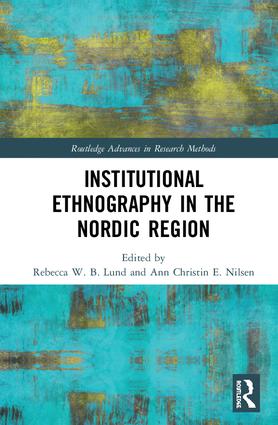Guest lectures and seminars - Page 3
This year's international women's day seminar explores the complex interdependence between men's movements and antifeminism, between right-wing populism, ethnonationalism and the ultra-conservative anti-gender movements. Invited speakers will shed new light on the attraction of extremist movements, conflicting gender images, as well as potential forms of feminist resistance.
The Centre for Gender Research invites you to book launch seminar connected to Rebecca W. B. Lund and Ann Christin E. Nilsen's most recent book publication Institutional Ethnography in the Nordic Region.
This seminar includes a public lecture, titled Food-getting, Water-carrying, Waste-picking: Women’s Work and Ecology in World Literature, by Sharae Deckard (University College Dublin). The lecture is followed by a structured roundtable with Treasa De Loughry (University of Exeter), Amy Rushton (Nottingham Trent University), Kate Houlden (Anglia Ruskin University) and Libe García Zarranz (NTNU), and chaired by Sorcha Gunne (STK).
Launching the Women, Peace and Security Index 2019/2020 - during Oslo Peace Days.
This talk will focus on models for studying norm contestation in world society, and then illustrates the model's use with reference to three case studies including fundamental rights, torture prohibition and sexual violence prohibition. The central research question asks: If norms lie in the practice and all practices are normative, whose practices count in global society?
In collaboration with the Institute of Health and Society, the Centre for Gender Research invites you to the seminar Donor Conception and the Unknown Kin: Reconsidering Identity and Family Through Anonymous and Deanonymized Relations with Martin Eggen Moseth.
As part of the seminar series Boys, Men and Masculinities (Gutter, menn og maskuliniteter), we invite you to the seminar Dominant Narratives of Masculinities within Educational Contexts with Professor Adam Howard (Colby College). The seminar is organized by the Centre for Gender Research in cooperation with The Faculty of Mathematics and Natural Sciences (Front2 project on gender balance).
This seminar focus on Kurdish women's lives and activism, in Kurdistan and in the diaspora. Although Kurdish women's movements have existed in the different regions of Kurdistan for many decades, relatively little attention has been given to their history and dynamics. This seminar brings together three academics who have done research on Kurdish women from three different regions: Minoo Alinia for Iraq, Nerina Weiss for Turkey, and Wendelmoet Hamelink for Syria.
The seminar will start off with an introduction by Professor Jacqui True, co-editor of the handbook and Director of Monash GPS , followed by a panel discussion (panelists to be announced). Inger Skjelsbæk (STK), Torunn L. Tryggestad and Louise Olsson (PRIO) have contributed to the handbook. At the event you will get the opportunity to meet them and other Norwegian contributors to the handbook.
STK celebrates its latest addition, Professor Inger Skjelsbæk, with an inaugural lecture under the title Conflict Related Sexual Violence in Research and Policy: Mapping out a knowledge field.
Welcome to an afternoon of talks and discussion on groundbreaking developments in diplomacy and peace processes with a focus on gender justice: What is a feminist foreign policy, and does it work? What difference does the entry of women into diplomacy make? How do international efforts address sexualized violence in conflict?



